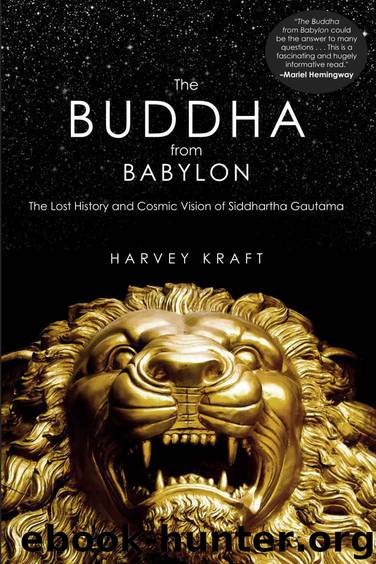The Buddha From Babylon by Harvey Kraft

Author:Harvey Kraft
Language: eng
Format: azw3, epub
ISBN: 9781590791431
Publisher: SelectBooks, Inc.
Published: 2014-05-01T04:00:00+00:00
KARMA
His reputation preceded him. As Sakamuni entered the area, word spread quickly that on this day the Buddha would direct his attention at the centerpiece of Brahmanism, the Doctrine of Soul Reincarnation. Hundreds gathered on the shore of the Ganges to see and hear the World-Honored One.
In the past, when kings and conquerors learned that the souls of their ancestors had joined the gods in Heaven, they coveted the prize of immortality. But not until the liberation scenarios of the Upanisads and the ascetic purifications of the Sramana did the concept and opportunity of soul ascension to the immortal plane become accessible to religious practitioners.
The Brahmanas stated that only their caste was qualified to defeat Samsara, because only a Brahmin’s soul could have evolved to a spiritual state worthy of being born a Brahmin. Because a Brahmin’s soul, Aht-man, was nearly as brilliant as the Creator’s immortal spirit, Brahman, through ritual practices and sacred readings it would take the final steps required before leaving the body in death to merge with the soul of Brahma. Their objective was to merge the Ahtman with the Brahman, the Spirit-Self of God, the Soul of All Souls, and the Divine Essence, thus attaining perfection in a state of immortal bliss.
After the Skeptics challenged the view that birth determined evolutionary superiority, some Brahmin men questioned whether bloodlines were enough to ensure their readiness for God. Some added Rishi ascetic practices to their repertoire, and set aside their senior years to pursue physical self-denial as a means for the purification of their soul.
Brahmins believed that the mortal soul (Skt. Ahtman) was the spirit containing the Self. But they concluded that souls were not all equal in quality, just as people had differing capacities and behaviors. Some souls were wild, while others had become spiritually evolved. For a soul to evolve, a person had to reject immoral acts.
Now facing an audience composed mostly of those who failed to qualify for liberation either by birth or purity, Sakamuni Buddha addressed the underlying fear in their eyes. Ordinary people accepted that their destiny would mean unrelenting hardships. They could not even conceive of a wish to ascend to the Heavens. Doomed to struggle against compelling temptations, they were terrified of the terrible specter of rebirth in the lower worlds. Caught in the unrelenting Cycle of Soul Reincarnation (Skt. Samsara) they could become hellions, hungry ghosts, angry demons, animals, or primitive humans. They had little to no hope for relief until the Buddha shocked them to the core of their being by revolutionizing the meaning of Karma.
The Jaina’s aspiration for liberation from the cycle of rebirth (Skt. Nirvana) focused on the achievement of perfect purification (Skt. Siddhas-ila) allowing for the return of the Eternal Soul (Jiva) to its homeland of Immortal Transcendence (Skt. Moksha) above the Heavens. To Jainas, all souls were utterly pure, but their shells were stained by human failings. To achieve purification of the Eternal Soul they espoused the practices of detachment, non-harm, and compassion. To
Download
This site does not store any files on its server. We only index and link to content provided by other sites. Please contact the content providers to delete copyright contents if any and email us, we'll remove relevant links or contents immediately.
Becoming Supernatural by Dr. Joe Dispenza(8217)
Crystal Healing for Women by Mariah K. Lyons(7931)
The Witchcraft of Salem Village by Shirley Jackson(7275)
Inner Engineering: A Yogi's Guide to Joy by Sadhguru(6796)
The Four Agreements by Don Miguel Ruiz(6765)
The Power of Now: A Guide to Spiritual Enlightenment by Eckhart Tolle(5782)
Secrets of Antigravity Propulsion: Tesla, UFOs, and Classified Aerospace Technology by Ph.D. Paul A. Laviolette(5371)
The Wisdom of Sundays by Oprah Winfrey(5161)
Room 212 by Kate Stewart(5121)
Pale Blue Dot by Carl Sagan(5008)
Fear by Osho(4740)
The David Icke Guide to the Global Conspiracy (and how to end it) by David Icke(4720)
Animal Frequency by Melissa Alvarez(4473)
Rising Strong by Brene Brown(4459)
How to Change Your Mind by Michael Pollan(4357)
Sigil Witchery by Laura Tempest Zakroff(4246)
Man and His Symbols by Carl Gustav Jung(4137)
The Art of Happiness by The Dalai Lama(4130)
Real Magic by Dean Radin PhD(4129)
